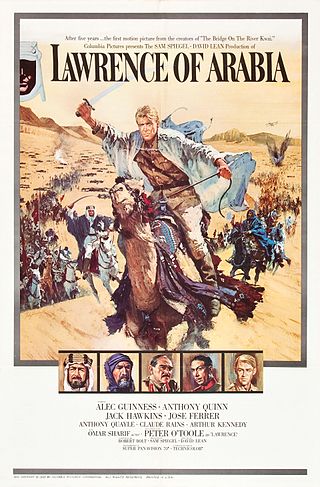
Lawrence of Arabia is a 1962 epic biographical adventure drama film based on the life of T. E. Lawrence and his 1926 books Seven Pillars of Wisdom. It was directed by David Lean and produced by Sam Spiegel through his British company Horizon Pictures and distributed by Columbia Pictures. The film stars Peter O'Toole as Lawrence with Alec Guinness playing Prince Faisal. The film also stars Jack Hawkins, Anthony Quinn, Omar Sharif, Anthony Quayle, Claude Rains and Arthur Kennedy. The screenplay was written by Robert Bolt and Michael Wilson.
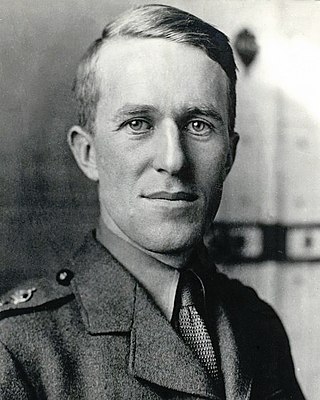
Thomas Edward Lawrence was a British archaeologist, army officer, diplomat, and writer who became renowned for his role in the Arab Revolt (1916–1918) and the Sinai and Palestine Campaign (1915–1918) against the Ottoman Empire during the First World War. The breadth and variety of his activities and associations, and his ability to describe them vividly in writing, earned him international fame as Lawrence of Arabia, a title used for the 1962 film based on his wartime activities.

Faisal I bin Al-Hussein bin Ali Al-Hashemi was King of Iraq from 23 August 1921 until his death in 1933. A member of the Hashemite family, he was a leader of the Great Arab Revolt during the First World War, and ruled as the unrecognized King of the Arab Kingdom of Syria from March to July 1920 when he was expelled by the French.

Field Marshal Edmund Henry Hynman Allenby, 1st Viscount Allenby, was a senior British Army officer and Imperial Governor. He fought in the Second Boer War and also in the First World War, in which he led the British Empire's Egyptian Expeditionary Force (EEF) during the Sinai and Palestine Campaign against the Ottoman Empire in the conquest of Palestine.

The Arab Revolt or the Great Arab Revolt was an armed uprising by the Arabs against the Ottoman Empire amidst the Middle Eastern theatre of World War I.

The Faisal–Weizmann agreement was signed by Emir Faisal, the third son of Hussein ibn Ali al-Hashimi, King of the short-lived Kingdom of Hejaz, and Chaim Weizmann, President of the Zionist Organization on 3 January 1919. Signed two weeks before the start of the Paris Peace Conference, it was presented by the Zionist delegation alongside a March 1919 letter written by T. E. Lawrence in Faisal's name to American Zionist leader Felix Frankfurter as two documents to argue that the Zionist plans for Palestine had prior approval of Arabs.

The Battle of Megiddo was fought between 19 and 25 September 1918, on the Plain of Sharon, in front of Tulkarm, Tabsor and Arara in the Judean Hills as well as on the Esdralon Plain at Nazareth, Afulah, Beisan, Jenin and Samakh. Its name, which has been described as "perhaps misleading" since very limited fighting took place near Tel Megiddo, was chosen by British commander Edmund Allenby for its biblical and symbolic resonance.
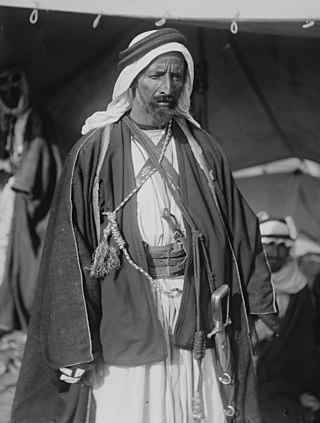
Auda Abu Tayeh or Awda Abu Tayih, nicknamed the Commander of the People or the Desert Falcon, was the Sheikh of a section of the Howeitat or Huwaytat tribe of Bedouin Arabs at the time of the Great Arab Revolt during the First World War. The Howeitat lived in what is now Saudi Arabia/Jordan.

The Battle of Aqaba was fought for the Red Sea port of Aqaba during the Arab Revolt of World War I. The attacking forces, led by Sherif Nasir and Auda abu Tayi and advised by T. E. Lawrence, were victorious over the Ottoman Empire defenders.

Ross is a 1960 play by British playwright Terence Rattigan.
Jackson Bentley is a fictional American journalist appearing in the film Lawrence of Arabia (1962); he is portrayed by Arthur Kennedy. He is based on the famed American journalist Lowell Thomas.

The 1921 Cairo Conference, described in the official minutes as Middle East Conference held in Cairo and Jerusalem, March 12 to 30, 1921, was a series of meetings by British officials for examining and discussing Middle Eastern problems, and to frame a common policy. The secret conference of British experts created the blueprint for British control in both Iraq and Transjordan. By offering nominal leadership of those two regions to the sons of the Sharif of the Mecca, Churchill felt that the spirit if not the actual letter of Britain's wartime promises to the Arabs were fulfilled.

The Arab Kingdom of Syria was a self-proclaimed, unrecognized constitutional monarchy existing briefly in the territory of historical Syria. It was announced on 5 October 1918 as a fully independent Arab constitutional government with the permission of the British military. It gained de facto independence as an Emirate after the withdrawal of the British forces from OETA East on 26 November 1919, and was proclaimed as a Kingdom on 8 March 1920.
Lt Col. Stewart Francis Newcombe (1878–1956) was a British army officer and associate of T. E. Lawrence.

This is the order of battle for the Battle of Megiddo (1918), the concluding engagement of the Sinai and Palestine Campaign of the First World War. The Entente's Egyptian Expeditionary Force, commanded by General Edmund Allenby and composed mainly of British, Indian, Australian and New Zealand troops, with a small French and Armenian contingent, cooperated with the Arab Northern Army, which was part of the Arab Revolt and was under the overall command of the Emir Feisal, in an all-out offensive against the Yıldırım Army Group, part of the army of the Ottoman Empire.
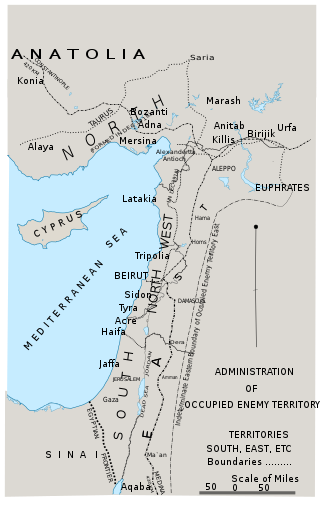
The Occupied Enemy Territory Administration (OETA) was a joint British, French and Arab military administration over Levantine provinces of the former Ottoman Empire between 1917 and 1920, set up on 23 October 1917 following the Sinai and Palestine Campaign and Arab Revolt of World War I. Although it was declared by the British military, who were in control of the region, it was followed on 30 September 1918 by the 1918 Anglo-French Modus Vivendi in which it was agreed that the British would give the French control in certain areas, and the Hashemites were given joint control of the Eastern area per T.E. Lawrence's November 1918 "Sharifian plan".

The Capture of Damascus occurred on 1 October 1918 after the capture of Haifa and the victory at the Battle of Samakh which opened the way for the pursuit north from the Sea of Galilee and the Third Transjordan attack which opened the way to Deraa and the inland pursuit, after the decisive Egyptian Expeditionary Force (EEF) victory at the Battle of Megiddo during the Sinai and Palestine Campaign of World War I. Damascus was captured when Desert Mounted Corps and Prince Feisal's Sherifial Hejaz Army encircled the city, after a cavalry pursuit northwards along the two main roads to Damascus. During the pursuit to Damascus, many rearguards established by remnants of the Ottoman Fourth, Seventh and Eighth Armies were attacked and captured by Prince Feisal's Sherifial Army, Desert Mounted Corps' Australian Mounted Division the 4th and the 5th Cavalry Divisions. The important tactical success of capturing Damascus resulted in political manoeuvring by representatives from France, Britain and Prince Feisal's force.

The Pursuit to Haritan occurred between 29 September and 26 October 1918 when the XXI Corps and Desert Mounted Corps of the Egyptian Expeditionary Force (EEF) pursued the retreating remnants of the Yildirim Army Group advanced north from Damascus after that city was captured on 1 October during the final weeks of the Sinai and Palestine Campaign of the First World War. The infantry and corps cavalry advanced from Haifa and Acre to capture the Mediterranean ports at Beirut and Tripoli between 29 September and 9 October. These captures enabled the inland pursuit to be supplied when the Desert Mounted Corps' 5th Cavalry Division resumed the pursuit on 5 October. The cavalry division occupied one after the other, Rayak, Homs, Hama. Meanwhile, Prince Feisal's Sherifial Force which advanced on the cavalry division's right flank, attacked and captured Aleppo during the night of 25/26 October after an unsuccessful daytime attack. The next day the 15th Cavalry Brigade charged a retreating column and attacked a rearguard during the Charge at Haritan near Haritan which was at first reinforced but subsequently withdrew further north.
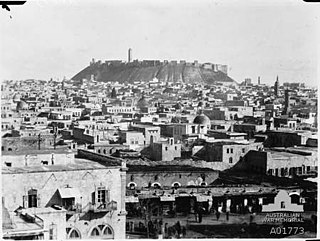
The Battle of Aleppo was fought on 25 October 1918, when Prince Feisal's Sherifial Forces captured the city during the Pursuit to Haritan from Damascus, in the last days of the Sinai and Palestine Campaign in the First World War.
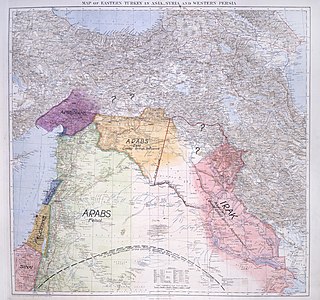
The Sharifian or Sherifian Solution, was an informal name for post-Ottoman British Middle East policy and French Middle East policy of nation-building. As first put forward by T. E. Lawrence in 1918, it was a plan to install the three younger sons of Hussein bin Ali al-Hashimi as heads of state in newly created countries across the Middle East, whereby his second son Abdullah would rule Baghdad and Lower Mesopotamia, his third son Faisal would rule Syria, and his fourth son Zeid would rule Upper Mesopotamia. Hussein himself would not wield any political power in these places, and his first son, Ali would be his successor in Hejaz.

















